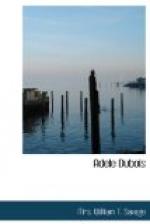At length, Mr. Norton said to him, “I trust you are not offended with me, my dear sir, for those plain words I addressed to you the other day. Be assured that though stern, they were dictated by my friendship for you and my duty towards God”.
“Offended! my good friend. O no. What you said, is true. But it is too late for me to know it. Through the merits of Christ, I hope for the pardon of my sins. I am willing to live and suffer, if it is His behest. But you perceive my power to act for the cause of truth is gone. My past has taken away all good influence from my future course. Who will accept my testimony now? I have probably lost caste in my own circle, and have, doubtless, lost my power to influence it, even should I be received back to its ties. In society, I am a dishonored man. I cannot have the happiness of working for the truth,—for Christ. My power is destroyed”.
“You are wrong, entirely wrong, my dear sir. Have courage. Shall not that man walk erect and joyous before the whole world, whatever his past may have been, whose sins have been washed away in the blood of Christ and whose soul is inspired by a determination to abide by faith in Him forever? I say, yes. Do the work of God. He will take care of you. Live, with your eye fixed on Him, ready to obey His will, seeking His heavenly aid, and you can face the frowns of men, while serene peace fills your heart”.
Thus cheered and strengthened from day to day, Mr. Brown gained gradually in health and hope. Especially did Mr. Norton strive to invigorate his faith. He justly thought, it was only a strong grasp on eternal realities, that could supply the place of those granite qualities of the soul, so lacking in this lovable, fascinating young man.
CHAPTER XIII.
THE GROVE.
In the meanwhile, three or four times during the week, Mr. Norton continued to hold meetings for the people in Micah’s Grove.
There had been but little rain in the Miramichi region during the summer and autumn. In fact, none worthy of note had fallen for two months, except what came during the late equinoctial storm. The grass was parched with heat, the roads were ground to a fine dust, which a breath of wind drove, like clouds of smoke, into the burning air; the forest leaves, which had been so recently stained with a marvellous beauty of brown, crimson and gold, became dim and shrivelled; a slight touch snapped, with a sharp, crackling sound, the dried branches of the trees; even the golden rod and the purple aster, those hardy children of autumn, began to hang their heads with thirst. All day long, the grasshopper and locust sent through the hot, panting air, their shrill notes, stinging the ear with discord. The heaven above looked like a dome of brass, and a thin, filmy smoke gathered around the horizon.
Even the rude settlers, with nerves toughened by hardship, unsusceptible of atmospheric changes, were oppressed by the long, desolating drought.




